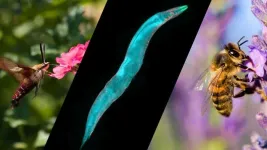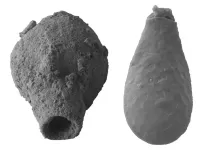(Press-News.org) The Kavli Foundation and the U.S. National Science Foundation are collaborating to accelerate research in the emerging field of neurobiology in changing ecosystems, stemming from the foundation’s efforts in this area first announced in 2023. A joint Kavli-NSF grantmaking program was launched in December of 2023.
Building on early success of this program, Kavli and NSF announce its continuation with a second call for proposals, open through February 10, 2025, for projects tackling hard problems in this understudied field.
Research in this area has great potential to reveal novel scientific insights about how the brain adapts to change at the molecular, biophysical, cellular, and neural circuit levels.
Awardees of the first Kavli-NSF grants will study the impact of atmospheric pollutants on the sense of smell in pollinators, and how neural circuits adapt to changes in temperature in simple organisms such as the roundworm.
At the University of Washington, researchers Jeffrey Riffell and Joel Thornton will investigate how pollutants like NO3 and ozone impact pollinators’ ability to recognize the scents of flowers. The team will focus on both daytime pollinators, the honeybee (A. mellifera), and a nocturnal pollinating moth (M. sexta) to examine how floral scents, degraded by pollutants, influence information processing in the primary olfactory center, the antennal lobe, and how this in turn affects the pollinators’ ability to locate flowers in the environment. As three-fourths of the world’s flowering plants and about one-third of the world’s food crops depend on animal pollinators for producing fruits, grains, and other crops, it’s crucial to understand how different chemical pollutants influence sensory processing and behavior in various insect pollinators.
Researchers at Brandeis University, Piali Sengupta and Eve Marder (2016 Kavli Prize Laureate), will study how the nematode worm C. elegans maintains resilience to temperature fluctuations, particularly in its feeding system, which includes a rhythmic neural circuit that activates feeding muscles. The researchers will combine experimental analyses and theoretical modeling to understand how temperature affects the feeding rhythm, focusing on how excitatory and inhibitory neuronal inputs and neuromodulation influence the feeding muscles’ response to temperature changes. The team will also examine natural variations in temperature resilience among wild C. elegans strains to understand how they have evolved specialized ways to manage temperature fluctuation. This in turn will further elucidate the ways in which animals have evolved to maintain functional resilience in changing environments.
“Through our collaboration with NSF, we are proud to support research that will give real, meaningful data to inform how the brain functions under certain types of strain imposed by environmental flux,” said Amy Bernard, director of life sciences at The Kavli Foundation. “The knowledge gained from these studies may lead to new insights into natural resilience mechanisms.”
END
Impact of pollutants on pollinators, and how neural circuits adapt to temperature changes
Awardees of the first Kavli-NSF grants in neurobiology and changing ecosystems
2024-10-04
ELSE PRESS RELEASES FROM THIS DATE:
Researchers seek to improve advanced pain management using AI for drug discovery
2024-10-04
An estimated one in five Americans live with chronic pain and current treatment options leave much to be desired. Feixiong Cheng, PhD, Director of Cleveland Clinic’s Genome Center, and IBM are using artificial intelligence (AI) for drug discovery in advanced pain management. The team’s deep-learning framework identified multiple gut microbiome-derived metabolites and FDA-approved drugs that can be repurposed to select non-addictive, non-opioid options to treat chronic pain.
The findings, published in Cell Press, represent one of many ways the organizations' Discovery Accelerator partnership is helping ...
‘Neutron Nexus’ brings universities, ORNL together to advance science
2024-10-04
Oak Ridge National Laboratory has launched its Neutron Nexus pilot program with Florida Agricultural & Mechanical University, or FAMU, and Florida State University, or FSU, through the FAMU-FSU College of Engineering. The first program of its kind nationwide, it’s aimed at broadening and diversifying the scientific user community with outreach to universities and colleges to increase collaboration and, ultimately, scientific advancement.
Although a recently planned two-day “ORNL Days” event in Florida was cut ...
Early release from NEJM Evidence
2024-10-04
This article was published Early Release to coincide with a presentation at the Symposium on Advanced Wound Care in Las Vegas, NV.
Full text is now available on evidence.nejm.org. Email mediarelations@nejm.org for access.
Original Article: Intact Fish Skin Graft to Treat Deep Diabetic Foot Ulcers
Dured Dardari, M.D, Ph.D., From the Diabetology Department, Center Hopitalier Sud Francilien, Corbeil-Essonnes, France, and the LBEPS, Université d’Evry, IRBA, Université Paris Saclay, 91025 Evry, France.
If you have any questions for our office, please contact our Media Relations ...
UMass Amherst astronomer leads science team helping to develop billion-dollar NASA satellite mission concept
2024-10-04
October 4, 2024
UMass Amherst Astronomer Leads Science Team Helping to Develop Billion-Dollar NASA Satellite Mission Concept
Alexandra Pope, science lead for the PRIMA space telescope, is on team developing next-generation space probe that will explore evolution of the universe
AMHERST, Mass. – A University of Massachusetts astronomy professor is science lead on a $5 million proposal selected by NASA to develop new space satellite missions that bridge gaps in our understanding of the evolution of ...
Cultivating global engagement in bioengineering education to train students skills in biomedical device design and innovation
2024-10-04
International collaboration between the Bioengineering Department at Clemson University, South Carolina and Arusha Technical College in Tanzania will further enhance development of a workforce skilled in biomedical device design and innovation. A recent National Science Foundation grant awarded to Dr. Melinda Harman, an Associate Professor at Clemson, along with her team of collaborators will develop innovative approaches to problem-based learning in bioengineering while fostering breakthroughs that address global health ...
Life on Earth was more diverse than classical theory suggests 800 million years ago, a Brazilian study shows
2024-10-04
About 800 million years ago (mya), before the supercontinent Pangea formed, the Earth was more diverse than classical theory suggests. By reconstructing the tree of life from the evolutionary history of amoebas and the ancestors of algae, fungi, plants and animals, Brazilian researchers have created a scenario in which several different lineages of many species inhabited the planet during the period. An article reporting their findings is published in Proceedings of the National Academy of Sciences of the United States of America (PNAS).
According to the literature, several lineages of eukaryotes that first emerged 1.5 billion years ago diversified and ...
International clean energy initiative launches global biomass resource assessment
2024-10-04
A multi-country, government-led initiative dedicated to advancing the global transition to a sustainable, bio-based economy, unveiled a new Global Biomass Resource Assessment, providing groundbreaking data on current and future sustainable biomass supplies around the world.
The results from this new global sustainable supply assessment will allow scientists, policymakers, and industry leaders to explore potential sources of biomass as a foundation for a circular and sustainable global bioeconomy, supporting ...
How much do avoidable deaths impact the economy?
2024-10-04
Two new papers in Nature Medicine by a global research team highlight the economic value of reducing avoidable deaths.
The first paper "applies novel methods to estimate the economic value of reducing avoidable deaths worldwide, finding that in 2019, 40 million deaths were avoidable—i.e., could have been prevented or delayed if individuals in all countries had access to the best available healthcare. The economic value of reducing these avoidable deaths is equivalent to 23% of annual global income, suggesting that ...
Federal government may be paying twice for care of veterans enrolled in Medicare Advantage plans
2024-10-04
PROVIDENCE, R.I. [Brown University] — From 2011 to 2020, the Veterans Health Administration spent $78 billion to care for U.S. military veterans enrolled in Medicare Advantage plans, raising questions about federal overpayments to those private plans.
That’s according to an analysis by researchers from Brown University and the Providence Veterans Affairs Medical Center. Published in JAMA, the study notes that because Medicare Advantage plans receive fixed per-patient payments for health care services without having payments reduced when veterans receive care ...
New therapeutic target for cardiac arrhythmias emerges
2024-10-04
A new study by researchers at the University of Arizona College of Medicine – Phoenix and the University of California Davis Health identified a new target for developing a therapy to treat atrial fibrillation, the most common type of abnormal heart rhythm.
Atrial fibrillation, commonly called AFib or AF, causes about 1 in 7 strokes, according to the U.S. Centers for Disease Control and Prevention, and is associated with a significant increase in the risk of morbidity and mortality. More than 12 million people are expected to have AFib by 2030, according to the American Heart Association, and current treatment ...
LAST 30 PRESS RELEASES:
Differing immune responses in infants may explain increased severity of RSV over SARS-CoV-2
The invisible hand of climate change: How extreme heat dictates who is born
Surprising culprit leads to chronic rejection of transplanted lungs, hearts
Study explains how ketogenic diets prevent seizures
New approach to qualifying nuclear reactor components rolling out this year
U.S. medical care is improving, but cost and health differ depending on disease
AI challenges lithography and provides solutions
Can AI make society less selfish?
UC Irvine researchers expose critical security vulnerability in autonomous drones
Changes in smoking status and their associations with risk of Parkinson’s, death
In football players with repeated head impacts, inflammation related to brain changes
Being an early bird, getting more physical activity linked to lower risk of ALS
The Lancet: Single daily pill shows promise as replacement for complex, multi-tablet HIV treatment regimens
Single daily pill shows promise as replacement for complex, multi-tablet HIV treatment regimens
Black Americans face increasingly higher risk of gun homicide death than White Americans
Flagging claims about cancer treatment on social media as potentially false might help reduce spreading of misinformation, per online experiment with 1,051 US adults
Yawns in healthy fetuses might indicate mild distress
Conservation agriculture, including no-dig, crop-rotation and mulching methods, reduces water runoff and soil loss and boosts crop yield by as much as 122%, in Ethiopian trial
Tropical flowers are blooming weeks later than they used to through climate change
Risk of whale entanglement in fishing gear tied to size of cool-water habitat
Climate change could fragment habitat for monarch butterflies, disrupting mass migration
Neurosurgeons are really good at removing brain tumors, and they’re about to get even better
Almost 1-in-3 American adolescents has diabetes or prediabetes, with waist-to-height ratio the strongest independent predictor of prediabetes/diabetes, reveals survey of 1,998 adolescents (10-19 years
Researchers sharpen understanding of how the body responds to energy demands from exercise
New “lock-and-key” chemistry
Benzodiazepine use declines across the U.S., led by reductions in older adults
How recycled sewage could make the moon or Mars suitable for growing crops
Don’t Panic: ‘Humanity’s Last Exam’ has begun
A robust new telecom qubit in silicon
Vertebrate paleontology has a numbers problem. Computer vision can help
[Press-News.org] Impact of pollutants on pollinators, and how neural circuits adapt to temperature changesAwardees of the first Kavli-NSF grants in neurobiology and changing ecosystems




